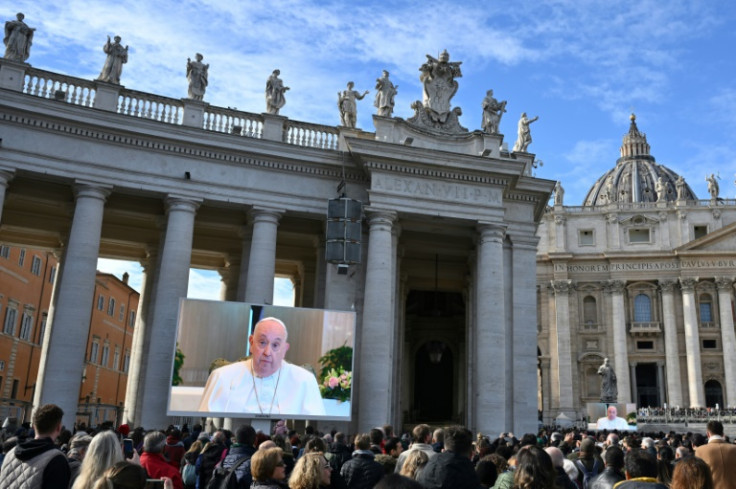Pope's Moral Force Aims To 'Tip' UN Climate Talks

He has used science to underpin his moral missives on climate change. Now Pope Francis hopes his historic presence at UN talks will help tip the balance in critical negotiations.
The 86-year-old pontiff, a defender of the poor who has made environmental activism a cornerstone of his 10-year papacy, will address the COP28 meeting in Dubai on December 2.
It will be the first time a pope has attended a COP since the process began in 1995, and Francis is expected to use the platform to castigate countries for a lack of action, and seek to persuade them to dramatically cut their greenhouse gas emissions.
He may also be able to play a role in rebuilding trust between climate-vulnerable nations and rich, consumerism-driven polluters.
"At a moment of global development as dark and challenging as the present one, the presence of a moral authority is more important than ever," professor Sverker Sorlin, a specialist in global environmental governance at the KTH Royal Institute of Technology in Stockholm, told AFP.
"The pope may not turn the tables at the meeting, but be a 'tipping point' that may nudge and push the negotiators... in the right direction," said Sorlin, whose work the pope has cited.
The leader of 1.3 billion Catholics, more than half of whom live in the developing world, Francis has long insisted on the link between climate change and poverty, with the world's most marginalised paying the highest price for global warming.
Two years after picking a papal name in honour of the patron saint of ecology, Francis in 2015 published a landmark thesis called "Laudato Si" (Praise Be To You) which lambasted manmade climate change and -- in an unprecedented move for a religious leader -- used science to do so.
A few months later, there was a breakthrough in UN climate talks in Paris, where countries committed to limit warming to "well below" two degrees Celsius above pre-industrial levels, and preferably the safer 1.5C limit.
But the UN warned this year that the world was far off track -- prompting Francis to publish an impassioned follow-up.
In "Laudate Deum" (Praise to God), released in October, he stressed that the world in which we live "is collapsing and may be nearing the breaking point", with some damage "already irreversible".
Despite that, the Dubai talks "can represent a change of direction", if countries commit to ditching fossil fuels for clean energy sources, he wrote.
Tebaldo Vinciguerra, a member of the Vatican office for environmental concerns, told AFP that a "central theme" in Dubai would be the financing of a "loss and damage" fund to help poorer countries hit by climate-induced disasters.
Catholic communities around the world describe struggles with pollution, limited access to drinking water, deforestation, desert encroachment and extreme weather events, Vinciguerra said.
Dubai negotiators cannot "act as if nothing has happened, or only seek to treat the symptoms", he said.
Vinciguerra said there was also "much to do" regarding a global stocktake of the world's progress on curbing warming.
Pope Benedict XVI kicked off the Vatican's green initiatives in 2008 by installing solar panels on its audience hall.
Fifteen years later, the Vatican produced its first nationally determined contribution (NDC) -- efforts to reduce emissions under the Paris Agreement -- in which it pledges to reduce greenhouse gases to 20 percent below the 2011 level by 2030.
Francis has drawn up an "Ecological Conversion 2030" plan for carbon-neutral projects and technologies, including switching to electric vehicles, although the tiny city state's contribution to global emissions is already negligible.
The Holy See also signed an environmental interfaith declaration earlier this month with 27 others including Chief Rabbi David Rosen, representatives of the grand imam of Cairo's Al-Azhar mosque, Patriarch Kirill, leader of the Russian Orthodox Church and Archbishop of Canterbury Justin Welby.
In a sign of the increasing engagement of religion in climate issues, this year's COP will include a faith pavilion for the first time, which Francis will inaugurate, and which will host over 65 sessions with religious figures, scientists, and political leaders.
"The pope's decision to engage personally and profoundly in environment and climate has been of tremendous importance," Sorlin said.
Amid "worrying reports" of many countries increasing rather than decreasing fossil fuel production, "the pope stands out as almost a divine presence among hordes of sinners".

© Copyright AFP {{Year}}. All rights reserved.





















